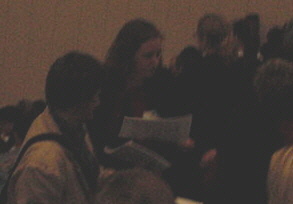Protesters at NZ Psychological Society Conference

Photo: Hilary Lapsley (left) & Eileen Swan hand out material critical of Professor Loftus.
Protesters at New Zealand Psychological Society Annual Conference on Sunday 27th August 2000 handed out 14 pages of material criticising Professor Loftus’ research methodology and ethics, information about published ‘evidence’ of repressed memories, and misinformation concerning the resignation of Loftus from the American Psychological Association. The document was compiled by:
- Sue Fitchett
- Ruth Jackson
- Ian Lambie
- Hilary Lapsley
- Judith McDougall
- Kim McGregor
- Katheryn McPhillips
- Andrew Moskowitz
- Eileen Swan
The information was all printed from the following websites, apart from the two Ethics & Behavior papers by Crook & Dean which are only available by mail (details below).
66 corroborated cases of recovered memories.
The Recovered Memory Project is an Internet-based research project, directed by Professor Ross E. Cheit of the Taubman Center for Public Policy and American Institutions at Brown University. http://www.brown.edu/Departments/Taubman_Center/Recovmem/Archive.html
False Memory Syndrome Facts
"The ordinary response to atrocities is to banish them from consciousness." — Judith Herman, M.D. in ‘Trauma and Recovery’. This site offers pointers to key resources about "false memory syndrome," dissociation, delayed recall, repression, and recovered memories of child abuse and other traumatic events. My goal is to offer easy access to accurate foundational information about "false memory syndrome", in the following arenas: scientific analysis, clinical practice, legal, philosophy, media, and organizations. In addition, I am including some links to supportive survivor resources. Linda Chapman. http://www.idealist.com/facts/scientific.shtml
Reprints of the first two articles below are available by request from [email protected] Please include your mailing address as they will be sent via postal mail.
Crook, L. & Dean, M. (1999). "Lost in a shopping mall" – A breach of professional ethics. Ethics & Behavior, 9(1), 39-50. ABSTRACT: The "lost in a shopping mall" study has been cited to support claims that psychotherapists can implant memories of false autobiographical information of childhood trauma in their patients. The mall study originated in 1991 as 5 pilot experiments involving 3 children and 2 adult participants. The University of Washington Human Subjects Committee granted approval for the mall study on August 10, 1992. The preliminary results with the 5 pilot subjects were announced 4 days later. An analysis of the mall study shows that beyond the external misrepresentations, internal scientific methodological errors cast doubt on the validity of the claims that have been attributed to the mall study within scholarly and legal arenas. The minimal involvement–or, in some cases, negative impact–of collegial consultation, academic supervision, and peer review throughout the evolution of the study are reviewed.
Crook, L. & Dean, M. (1999). Logical fallacies and ethical breachs. Ethics & Behavior, 9(1), 61-68. The authors address Loftus’ reliance on the ad hominem technique (Loftus, 1999) to establish a clear distinction between her characterization of them and the legitimacy of their concerns regarding the ethics of her research.
Notes From The Controversy Ethics Complaints Filed Against Prominent FMSF Board Member APA Declines To Investigate. In December 1995, two women filed ethics complaints with the American Psychological Association (APA) against Elizabeth Loftus, PhD, regarding her published statements about two legal cases involving delayed memories of sexual abuse. Citing procedural considerations, however, the APA has declined to investigate the women’s ethics complaints. http://fmsf.net/apa-complaint.shtml
False Memory Syndrome
One of controversies related to psychological therapy for survivors of human cruelty is the topic of recovered memory. Within the last few years the credibility of survivors and of mental health professionals specializing in therapy for survivors has been questioned. A spate of articles and books has lampooned the rhetoric of victimhood and a few of the practices of trauma therapy. They have unjustly made all survivors sound like complainers and all trauma therapists sound like quacks. As is true for anyone, survivors must make careful choices about their mental health care. But for survivors, the current climate of ridicule renders careful consideration nearly impossible. Scare stories about false memories and unethical therapists are keeping many, many survivors away from therapy — and perhaps recovery — entirely. Ken Pope, Ph.D., ABPP is an American Psychological Association Fellow and former chair of the APA Ethics Committee. http://www.sover.net/~schwcof/popelet.html
More on this controversy on John Read page



